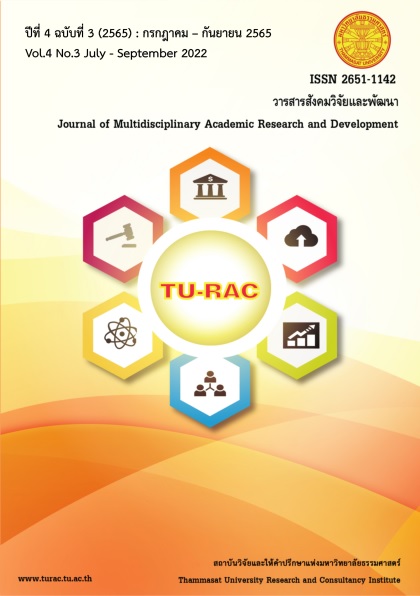Constitutional Judicial Review Reform in Thailand
Keywords:
Reform, Constitution, Constitutional Review, Constitutional CourtAbstract
This research examines ways to reform organizations with power over constitutional review in Thailand. The aim is to solve issues of impartiality, independence, and distortion affecting the overall constitutional structure.
Results were that the main power of the Constitutional Court is constitutional review in addition to complementary powers. The court, along with the Constitution of the Kingdom of Thailand 1997, was dissolved and replaced by a Constitutional Tribunal following the 2006 Thai coup d'état. Today, the Constitutional Court retains the power to review constitutionality, leading to many problems. Constitutional Court were so extended that they transgressed political boundaries to areas where other state bodies were assigned by rulings. This power was used to distort the Constitution, with the Constitutional Court exerting itself to dominate other constitutional organizations. These issues were not caused by judges of the Constitutional Court, but were rooted in constitutional provisions absolving the Constitutional Court from legal or political responsibility for consequences of its rulings. These characteristics led directly to distortions in enforcing the Constitution, which in part created ongoing problems in Thai politics.
When the Constitutional Court is charged with determining the constitutionality of a law, more legal and political complications are created than under previous systems. However, constitutional review remains important. Therefore, it is necessary to develop a form of fully conceptualized constitutional review to ensure that the system for determining constitutionality of laws is appropriate and compatible with Thai politics and society.
References
เกรียงไกร เจริญธนาวัฒน์. (2555). หลักพื้นฐานกฎหมายมหาชน. กรุงเทพมหานคร: วิญญูชน.
ต่อพงศ์ กิตติยานุพงศ์. (2564). เมื่อศาลรัฐธรรมนูญตั้งตนเหนือศาลอื่น : พิทักษ์หรือบั่นทอนรัฐธรรมนูญ?. สืบค้นเมื่อ 25 มีนาคม 2564, จาก https://www.the101.world/constitutional-complaint/.
ธีระ สุธีวรางกูร. (2563). ระบบศาลและการพิจารณาคดีของศาลในทางกฎหมายมหาชน. (พิมพ์ครั้งที่ 2). กรุงเทพฯ: โครงการตำราและเอกสารประกอบการสอน คณะนิติศาสตร์ มหาวิทยาลัยธรรมศาสตร์.
นันทวัฒน์ บรมานันท์. (2557). รายงานการศึกษาวิจัย เรื่อง สถานะและบทบาทของศาลรัฐธรรมนูญไทยภายใต้กรอบทิศทางการแก้ไขรัฐธรรมนูญแห่งราชอาณาจักรไทย พุทธศักราช 2550. กรุงเทพมหานคร: สำนักงานศาลรัฐธรรมนูญ.
บรรเจิด สิงคะเนติ. (2560). ความรู้ทั่วไปเกี่ยวกับศาลรัฐธรรมนูญ. (พิมพ์ครั้งที่ 2). กรุงเทพฯ: วิญญูชน.
บวรศักดิ์ อุวรรณโณ. (2538). กฎหมายมหาชน เล่ม 3 ที่มาและนิติวิธี. กรุงเทพฯ: นิติธรรม.
มานิตย์ จุมปา และ พรสันต์ เลี้ยงบุญเลิศชัย. (2552). รัฐธรรมนูญแห่งสหรัฐอเมริกา คำอธิบายเรียงมาตราพร้อมคำพิพากษาศาลฎีกา. กรุงเทพฯ: วิญญูชน.
วรเจตน์ ภาคีรัตน์. (2555). คำสอนว่าด้วยรัฐและหลักกฎหมายมหาชน. กรุงเทพฯ: โครงการตำราและเอกสารประกอบการสอน คณะนิติศาสตร์ มหาวิทยาลัยธรรมศาสตร์.
วศิน ยิ้มแย้ม และ นพดล นิ่มหนู. (2564). การควบคุมความชอบด้วยรัฐธรรมนูญของกฎหมายโดยศาลฎีกาในประเทศญี่ปุ่น. วารสารกฎหมาย คณะนิติศาสตร์ จุฬาลงกรณ์มหาวิทยาลัย. 39(2), 1-15.
วศิน ยิ้มแย้ม. (2562). ปัญหาเกี่ยวกับการแก้ไขเพิ่มเติมรัฐธรรมนูญในประเทศไทย. (ปริญญาดุษฎีบัณฑิต). สถาบันบัณฑิตพัฒนบริหารศาสตร์, คณะนิติศาสตร์.
สมคิด เลิศไพฑูรย์. (2551). การพิจารณาวินิจฉัยความชอบด้วยรัฐธรรมนูญของบทบัญญัติแห่งกฎหมาย กฎ ข้อบังคับ หรือการกระทำของบุคคลตามรัฐธรรมนูญ ซึ่งเสนอโดยศาลหรือผู้ตรวจการแผ่นดินของรัฐสภา. กรุงเทพมหานคร: สำนักศาลรัฐธรรมนูญ.
Ali Rıza Ç. (2008) Concrete Review of Norms by the Turkish Constitutional Court. Comparing Constitutional Adjudication, A Summer School on Comparative Interpretation of European Constitutional Jurisprudence 3rd Edition, university of Trento.
Başlar, K. & Tülen H. (2004). The Constitutional Court: 1962-2003 (An Introduction to the Composition and Functions of the Constitutional Court of the Republic of Turkey. Retrieved June 3, 2021., from https://www.anayasa.gen.tr/baslar1-text.pdf.
Chemerinsky, E. (2015). Constitutional Law: Principles and Policies. New York: Wolters Kluwer.
Garlicki, L. (2007). Constitutional courts versus supreme courts. International Journal of Constitutional Law. 5(1), 44-68.
Köker, L. (2010). Turkey's Political - Constitutional Crisis: An Assessment of the Role of the Constitutional Court. Constellations. 17(2), 328-344.
Limbach, J. (Jan., 2001). The Concept of the Supremacy of the Constitution. The Modern Law Review. 64(1), 1-10.
Downloads
Published
How to Cite
Issue
Section
License
Copyright (c) 2022 วศิน ยิ้มแย้ม

This work is licensed under a Creative Commons Attribution-NonCommercial-NoDerivatives 4.0 International License.



